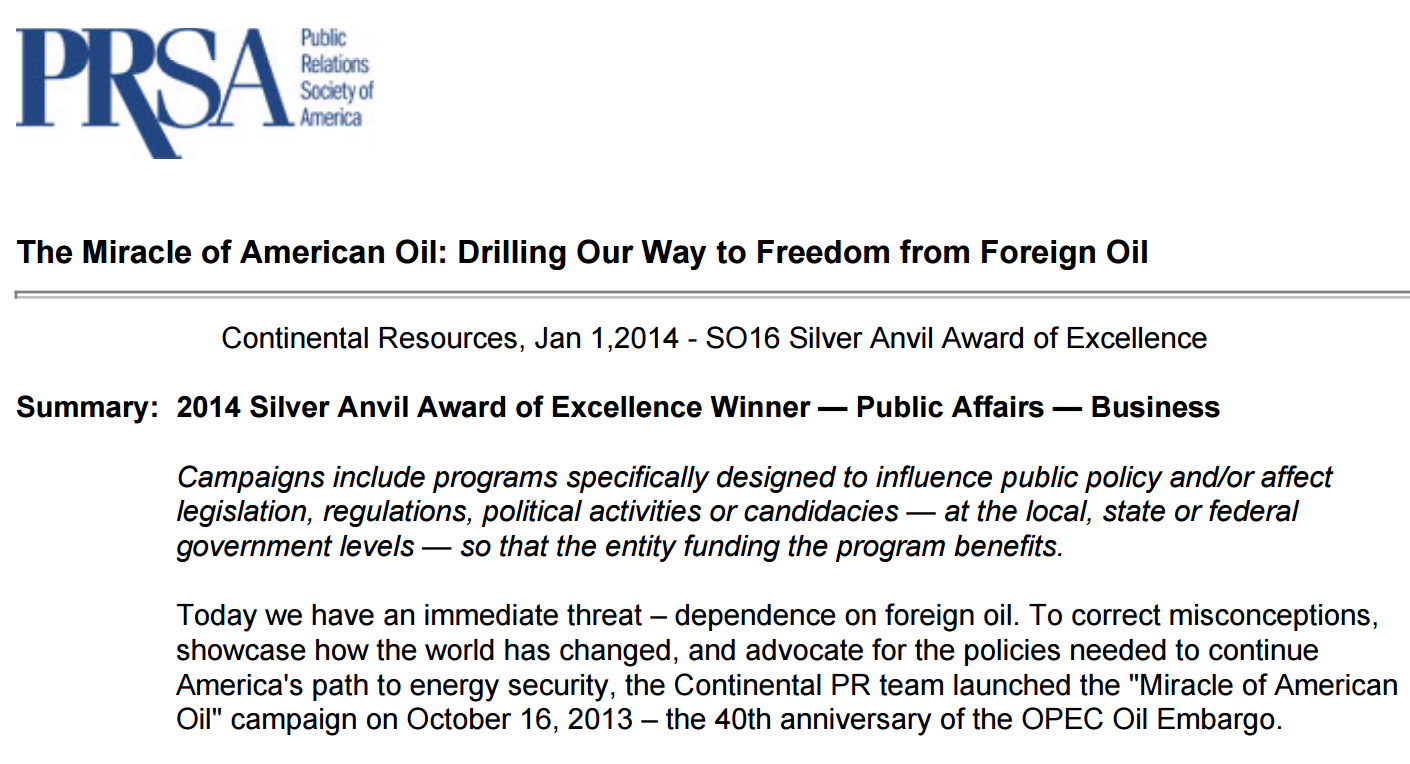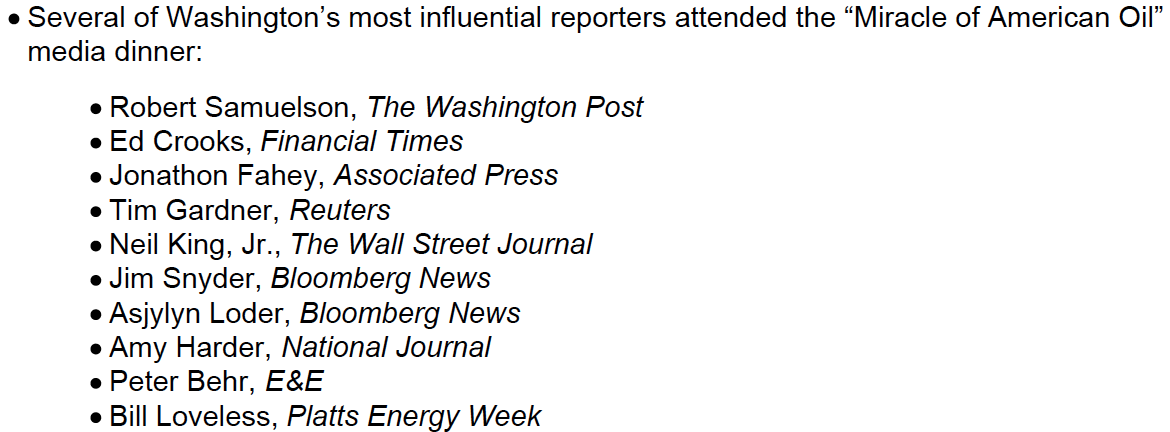A document published by the Public Relations Society of America, discovered by DeSmog, reveals that from the onset of its public relations campaign, the oil industry courted mainstream media reporters to help it sell the idea of lifting the ban on crude oil exports to the American public and policymakers.
Calling its campaign the “Miracle of American Oil,” the successful PR effort to push for Congress and the White House to lift the oil exports ban was spearheaded by Continental Resources, a company known as the “King of the Bakken” shale oil basin and founded by Harold Hamm. Hamm served as energy advisor to 2012 Republican Party presidential candidate Mitt Romney.
Image Credit: Public Relations Society of America
The campaign launched on December 16, 2013, the 40th anniversary of the Organization of the Petroleum Exporting Countries (OPEC) oil embargo, and won the prestigious PRSA Silver Anvil Award.
According to the document, submitted to PRSA to detail the logistics and reach of the PR effort, it was “designed to influence public policy and/or affect legislation, regulations, political activities or candidacies — at the local, state or federal government levels.”
And it all began with a kick-off dinner in Washington, D.C., hosted by Continental Resources and attended by some of the most influential mainstream media energy reporters in the United States.
Regular readers of the Washington oil and gas industry beat will find the names of the dinner attendees, disclosed in the document, familiar.
Image Credit: Public Relations Society of America
“The campaign not only served as a catalyst to correct public misconceptions, but it also propelled crude oil exports to the top of the U.S. Senate’s agenda,” Continental boasted on the PRSA document.
While the document fails to note when and where the dinner unfolded, Amy Harder, one of the reporters in attendance, revealed the details.
In a December 20 Wall Street Journal article offering an overview and inside look at the industry’s exports crusade, Harder revealed that the dinner took place at Washington, D.C.’s ostentatious 5-star Hay-Adams Hotel in October 2013 and Harold Hamm attended the meeting.
Harder ended up publishing two exports articles favorable to the industry’s point of view in the few months after being invited to the exclusive Hay-Adams Hotel dinner.
Asked for more details about the dinner, Harder told DeSmog via email that she did not “feel comfortable sharing with you any more information about the dinner,” also denying her attendance there shaped the slant of her articles.
One of Harder’s articles published in January 2014 offers more dinner details, noting it “was organized by the Domestic Energy Producers Alliance” (DEPA) and attended by “other domestic-energy executives” beyond just Hamm.
DEPA has spent $75,000 lobbying for Congress to lift the oil exports ban in 2015, according to lobbying disclosure forms reviewed by DeSmog.
U.S. Rep. Martin Frost; Photo Credit: Wikimedia Commons
One of the lobbyists deployed by DEPA, David Crane of Quadripoint Strategies LLC, formerly worked as senior policy advisor for U.S. Sen. John McCain (R-AZ) and U.S. Sen. Trent Lott (R-MS). DEPA also deployed former U.S. Rep. Martin Frost (D-TX) to lobby on its behalf on the issue.
The DEPA coalition has also given U.S. Sen. Heidi Heitkamp (D-ND) $10,000 in campaign money since the 2014 electoral cycle, the first campaign cycle of her first term that began in January 2013. Heitkamp has positioned herself as among the most outspoken members of Congress in support of lifting the ban.
DEPA has also utilized the “miracle” language in its advocacy materials associated with the push to lift the oil exports ban.
Months after the dinner, Hamm testified at a hearing in front of the U.S. Senate Energy and Natural Resources Committee, calling for an end to the oil exports ban. Metadata from that testimony reviewed by DeSmog shows his speech was written by the then-director of public relations for Continental, Mary Ann Osko.
Image Credit: U.S. Senate Energy and Natural Resources Committee
According to a story published by Bloomberg, Hamm “visited Capitol Hill almost weekly and testified at some of the at least nine congressional hearings on exports.”
Rebranding Fracking: “Horizontal Drilling”
Continental also made a concerted effort to pivot away from using the term “fracking,” opting instead to use term “horizontal drilling” to describe the hydraulic fracturing technique.
“The PR team’s objectives to showcase the benefits of America’s oil and natural gas renaissance, change the vernacular from fracking to horizontal drilling, and launch crude oil exports to the top of the U.S. policy agenda were all achieved,” explained Continental in the document (emphasis added).
Continental’s diction choice has a basis in the scholarly literature on the topic.
A July 2013 survey-based study by Louisiana State University (LSU) Public Policy Research Lab professors concluded that “the unpleasant sound of the word ‘Fracking’ might be partially responsible for view of the safety of the process” and that those “who did not hear the word…are more likely to say they think the process is safe.”
An earlier study done by the PR firm Gregory FCA came to similar conclusions.
“The very term ‘fracking’ has a negative connotation…The industry needs to identify negatively charged words and replace them with positive language,” reads a February 2011 Gregory FCA blog post. “The industry needs to control the story by controlling the lexicon through creative, positive words that tell a vivid story and lock out the language of critics.”
Hamm used the term “horizontal drilling” five times during his January 2014 congressional testimony and an additional four times in a Forbes opinion piece Hamm published advocating for a lift of the U.S. oil exports ban.
The company also emphasized that this is a “renaissance” and not a “boom” in its PR efforts. Booms often go bust, as we have shown on DeSmog repeatedly, most recently in the case of where the Bakken may be headed.
Continental representatives also repeatedly used the term “renaissance” in media appearances, during state-level and federal-level legislative testimony, at public speaking events, on a company earnings call, and on the company’s website.
DEPA also utilizes the “renaissance” language on its advocacy website, PowerPoint presentations, press releases, newspaper editorials and in letters written to policymakers. DEPA had little to say in response to questions sent via email by DeSmog.
“I can tell you that DEPA is very proud of the bipartisan work to educate we have done and will continue to do regarding all forms of energy,” Peter Regan, DEPA‘s executive director, told DeSmog.
Continental Responds
Lifting the oil exports ban is something Oil Change International called tantamount to cooking the climate, an analysis also shared by the Center for Biological Diversity and others.
But when asked by DeSmog if Continental believed climate change was an issue, Kristin Thomas, vice president of public relations for Continental, said the company “doesn’t take an official position on the issue.”
Instead, Thomas pointed to Continental’s corporate responsibility report, which does not mention climate change or global warming. Climate change impacts of lifting the export ban, unsurprisingly, did not make it into Continental’s PR narrative pitch to reporters.
Thomas also denied that the PR campaign was, at its core, geared toward gaining Continental and the oil industry favorable publicity.
“This is not about seeking press coverage to portray someone in a positive light,” she said in an email. “This is a topic that was and is very important.”
Maura Stephens, associate director of the Park Center for Independent Journalism at Ithaca College, disagrees.
“Some mainstream reporters are obviously being directed by their editors and producers to simply parrot whatever industry spokespersons and corrupt politicians say,” Stephens told DeSmog.
“And apparently U.S. policymakers are incapable of or disinterested in distinguishing between PR propaganda and scientific and economic evidence. This type of travesty highlights how critical to democracy it is that more people tune into independent, non-corporate-run news sources.”
Image Credit: Shutterstock | Aleksandar Mijatovic
Subscribe to our newsletter
Stay up to date with DeSmog news and alerts










